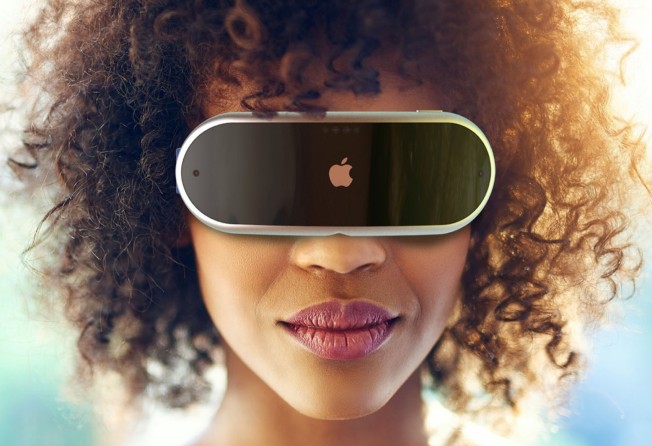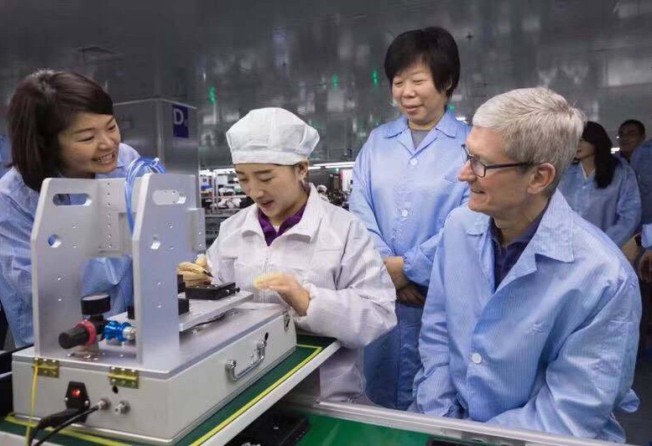
Apple casts fresh vote of confidence in China’s manufacturing supply chain as Luxshare said to make new mixed-reality headset
- The reported deal would mark the first time that Apple has enlisted a mainland Chinese supplier to build a ‘first-generation’ product
- Shenzhen-based Luxshare, which is Apple’s primary contract manufacturer of AirPods, was recently tapped to make iPhones

Apple appears to have cast a fresh vote of confidence in China’s manufacturing supply chain, following news that it selected AirPods supplier Luxshare Precision Industry Co to build the US tech giant’s much-anticipated mixed-reality headset.
While neither Apple nor Luxshare officially confirmed that deal, which was first reported by Nikkei Asia on Thursday, analysts said the partnership was a natural development given the Chinese contractor’s long experience with building innovative wearable consumer electronics devices.
“It was just a matter of time before Apple tapped Luxshare to make a new product,” said Ivan Lam, a senior analyst at tech consultancy Counterpoint Research. He added that this deal would mark the first time that Apple has enlisted a mainland Chinese supplier to build a “first-generation” product.
Apple aims to unveil the new device, which melds virtual reality (VR) and augmented reality (AR) technologies, at its annual Worldwide Developers Conference in June, according to a report last week by Bloomberg, which cited people familiar with the matter.

“Apple’s strategy to have multiple suppliers for one product works on a new product as well,” Counterpoint’s Lam said. “It has contracted Foxconn or Pegatron [to make] new products before. Now it’s Luxshare’s turn.”
Such a deal for Luxshare, which is also known as Luxshare-ICT, would signal the rapidly growing confidence of Apple in the Shenzhen-based company, despite geopolitical and economic developments that could potentially speed up global supply chain realignments.
Luxshare was reportedly tapped by the US tech giant last year to assemble a small number of iPhone 14 Pro Max handsets at its manufacturing facility in Kunshan, a city in eastern Jiangsu province.
The company, which was founded in 2004, was also awarded orders for the iPhone 15 Pro models scheduled for release later this year, according to a report by Taiwanese tech research firm TrendForce.
In a blog post published on Friday, TF International Securities’ Kuo Ming-chi, an analyst who tracks Apple’s supply chain, said he expected a joint venture between Luxshare and Pegatron Corp to take over the mixed-reality headset development and production resources from the Taiwanese firm in the first half of this year.
“It essentially means that Luxshare-ICT will take over this product’s subsequent design and production,” Kuo said. He indicated that the change would reduce the costs of making the headset, which is what Apple wanted.
Tapping Luxshare for the assembly is expected to help in the commercial release of the new device, which had been delayed multiple times over the years, according to Kuo.
Apple made its first move into the AR field in 2015, when it acquired San Francisco-based start-up Metaio, which heightened speculation about the iPhone maker’s push into the virtual entertainment space.

Counterpoint’s Lam said so-called XR devices, which include a range of offshoots from AR and VR to mixed reality, have become popular with many users.
VR immerses a user in an imagined world, like in a film or video game, with the aid of an opaque headset such as those from Oculus Quest, a division of Facebook parent Meta Platforms. AR provides an overlay of digital imagery onto the real world with the use of a clear headset, like Microsoft Corp’s HoloLens, or with newer smartphones and tablets.
Global shipments of AR and VR headsets, however, have declined by more than 12 per cent year on year to 9.6 million units in 2022, according to data from CCS Insight.
One of the factors that hinder wider adoption of VR devices in mainland China is insufficient applications, such as video games, according to Deng Liang, chief analyst at local gaming consultancy Youxiputao.com.
“The biggest problem for VR gaming is that it’s still a niche market,” Deng said. “While there are some nice games in the market, there are generally not a lot of quality games on VR platforms.”